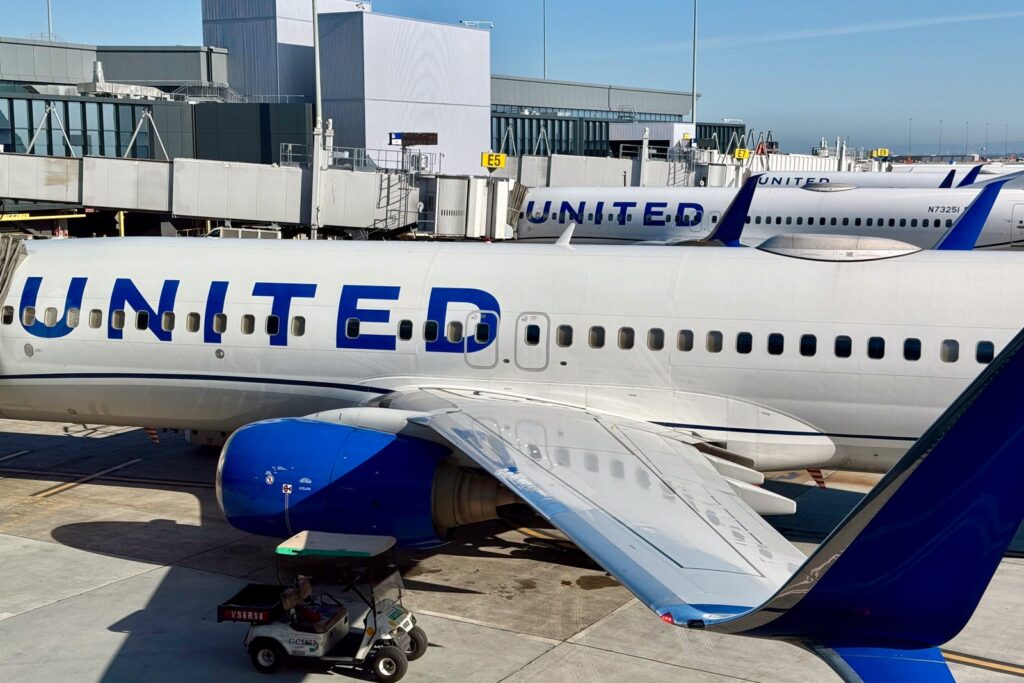United Airlines is slashing early-morning and late-night flights, citing softening demand and growing economic concerns. Yet, the airline says its core base of customers is planning another summer flying to far-flung destinations in premium seats.
This week the Chicago-based carrier reported a $387 million profit during the first three months of 2025. That was far better than last year, and it was no small feat: The first quarter tends to be the weakest, every year, for airlines, and many don’t turn profits at all.
United fell victim to the same forces that have beset much of the U.S. airline and travel industry in recent weeks, amid President Donald Trump’s trade war: plummeting demand from would-be customers abroad — particularly in Canada and Europe — along with growing concern from U.S. consumers and a steep drop-off in government travel.
“I feel like we’re marching toward a recession scenario,” United chief financial officer Michael Leskinen acknowledged on a conference call Wednesday.
A study released last week by the University of Michigan found consumer sentiment fell for the fourth straight month, amid growing concerns about personal finances and a possible recession. The consumer sentiment reading was down 30% from December.
Cutting flights amid growing financial concerns
To fend off lower travel demand than the airline had expected at the start of the year, United this week said it’s cutting flights during off-peak hours — particularly departures earlier than 7 a.m. or later than 8 p.m.
The most dramatic changes will start during the third quarter of this year, executives said.
That’s on top of capacity cuts the carrier already made, including on routes between the U.S. and Canada — along with red-eye flights and on routes historically buoyed by travelers flying on official U.S. government business.
April-through-June bookings from passengers originating in Europe are currently down 6% versus last year, the airline shared — and down 9% from Canada-originating passengers.

Daily Newsletter
Reward your inbox with the TPG Daily newsletter
Join over 700,000 readers for breaking news, in-depth guides and exclusive deals from TPG’s experts
United reports silver linings
But United executives, speaking to Wall Street analysts, pointed to a few silver linings.
Drop-off ‘stabilized’ … for now, at least
While bookings dropped sharply several weeks ago, the drop-off hasn’t continued to get worse — at least so far — chief commercial officer Andrew Nocella told analysts.
“There’s a tremendous amount of uncertainty in the economy right now and we’ve already seen a reduction in demand,” he explained. “But we’ve seen stability at that lower demand level in the last six weeks.”
Bookings for the peak summer travel season, he noted, are actually — ever so slightly — ahead of this point last year.
Premium, international still going strong
What’s more: the carrier, which has increasingly aimed to cater (like Delta Air Lines) to high-dollar travelers, remains bullish on its eclectic long-haul route network and its array of upscale offerings, from its Premium Plus premium economy cabin to its Polaris business-class product.
The airline next month will launch service to an array of alluring new destinations, including nonstop flights to Greenland, Mongolia and Sicily.
“So far we’ve seen no deterioration in high-end consumers willing to purchase a premium experience,” Nocella said Wednesday. “We attribute this to the fact that the economic uncertainty has a larger impact on more budget-minded, discretionary travelers than those seeking a premium experience.”
United executives further argued the airline’s loyal customer base will be a stalwart for the airline — far more than its competitors — even if economic conditions worsen.
It’s worth noting, that’s a slightly different take than the one offered this week by the chief executive of one of the nation’s top budget airlines, who claimed souring economic conditions could be good for the low-cost airline industry.
“In any type of recessionary or economically-challenged environment, the ‘Walmart effect’ — businesses like ours do well,” Frontier Airlines CEO Barry Biffle said in an interview with NBC News.
Frontier and its low-cost competitors have encountered their fair share of hurdles in recent years, trailing larger network carriers — United among them — in profitability.
Cobrand card spending not letting up
Another sign consumers haven’t entirely thrown in the towel on big purchases: spending on United’s portfolio of cobranded credit cards, during the first three months of the year, was up 9% versus last year, the airline reported.
Those spending trends, Nocella noted, appeared to continue into early April.
Still, executives said more cuts to the airline’s flying schedule could come if the economic outlook deteriorates further.
Read more: United credit cards add statement credits and higher annual fees — is it worth keeping your card?
Old aircraft retired
As part of cuts to its flying schedule in 2025, United moved up the retirement date for 21 of its oldest planes.
The airline has orders for hundreds of new jets over the coming years, with a particular focus on long haul-capable widebody aircraft like the Boeing 787 Dreamliner.
Starlink launches next month
United remains on track to launch the first service on a United Express regional jet featuring its new fast, free Starlink-powered Wi-Fi service. That launch is slated for next month, Nocella shared Wednesday.
TPG last month got a behind-the-scenes look at the installation process on board an Embraer 175 aircraft.
The first United mainline jet should be flying with the new internet service by the end of 2025, executives reiterated Wednesday.
Access will be free for MileagePlus members.
More gates in at O’Hare
United on Wednesday confirmed it recently won control of six more gates at its home base, Chicago’s O’Hare International Airport (ORD).
That’s notable amid something of a build-up by American Airlines, its top O’Hare competitor.
American’s total number of seats departing ORD this summer were set to be 22% higher than last year, according to data from aviation analytics firm Cirium.
But United remains far bigger, with 29% seats than American scheduled for June, July and August.
Related reading:

